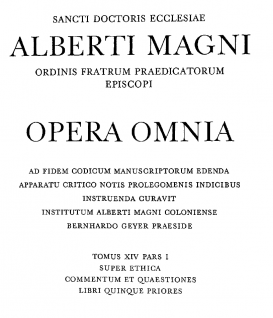Albert’s scientific program of study, as laid out in his Commentary on the Physics, is an ordered studying of the natural sciences that leads to the perfective telos of the human being. Albert places the study of ethics at the very end of this philosophical curriculum, after the study of metaphysics. Identifying the goal of ethics as the perfection of the human being, Albert envisions the science of ethics at the end of a long process of perfection to the fully actualized human nature. Since this scientific program of study was meant to be realized in real human beings, we can see how the ordered studying of the sciences translates into two groups of people—the student and the expertus. The student (juvenis), who is at the beginning of the process to perfection, lacks the experience needed to be a proper subject of ethics. The expertus, on the other hand, has the perfection of experience and thereby is the proper listener of the science of ethics.
My project looks at Albert’s analyses of the student and the expertus to investigate the role of the sense of hearing in acquiring the experience needed not only to be a subject of ethics, but also as instrumental in achieving the perfective telos of the human being. This is reached through a process of noetic development that culminates in the intellectus adeptus, a concept inspired by al-Farabi’s De intellectu.

